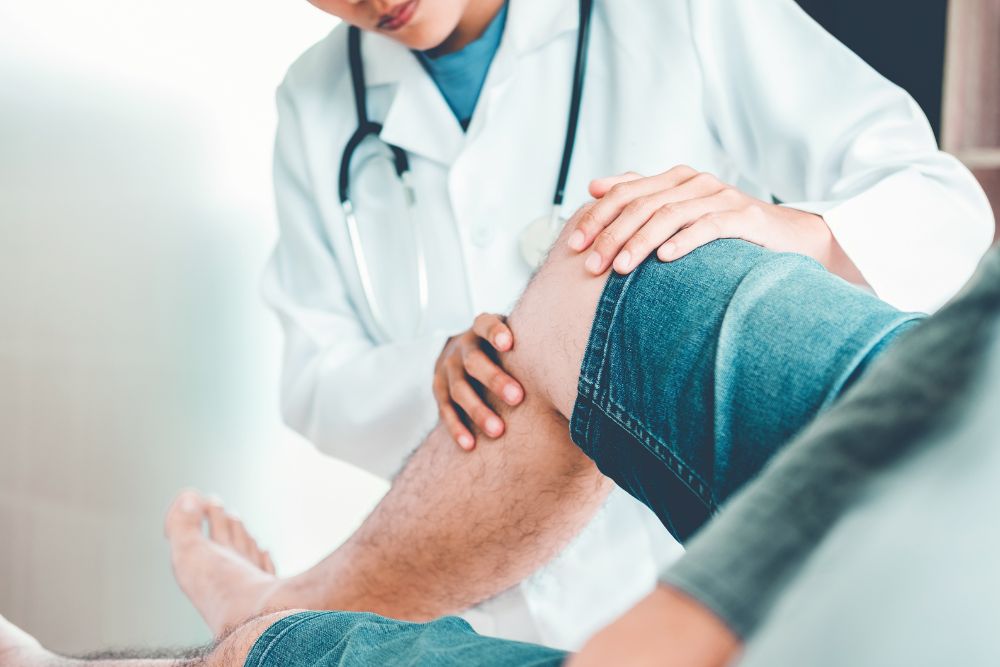
If you have been experiencing knee pain, it’s crucial to understand the significance of its symptoms and the necessity of quality medical treatment when needed. Orthopedic specialist play an essential role in diagnosing, treating, and managing knee pain due to a wide range of causes. The advantage of consulting with an orthopedic knee specialist is that these experts often recommend conservative treatment before automatically opting for surgery. But how do you know when it’s time to seek medical treatment or if it’s better to let your knee condition or injury heal on its own? Keep reading to learn about the causes and symptoms of knee pain and when to see an orthopedic knee specialist.
Knee pain has a wide range of origins, including accidents, overuse, and medical conditions.
Knee Injuries & Overuse Conditions
Meniscus tears – common, particularly in athletes. The meniscus is a layer of cartilage that cushions the space between the thigh bone and the shin bone. A sudden twisting movement can cause the meniscus to tear, resulting in pain, swelling, and difficulty rotating the knee.
ACL (Anterior Cruciate Ligament) injury – the ACL is a major ligament in the knee. An ACL injury may result from sports injuries or abrupt stopping and changing direction (e.g., sudden pivoting movements). A torn ACL often requires surgical repair.
MCL (Medial collateral ligament) Injury – the MCL is located on the inner side of the knee. Direct blows to the knee's outer side can injure the MCL, resulting in pain and instability of the knee.
Patellofemoral Pain Syndrome (runner's knee) – causes pain around the kneecap and on the front of the knee. Patellar (i.e., pertaining to the kneecap) misalignment or overuse are common causes.
IT Band Syndrome – the iliotibial (IT) band is a thick band of tissue along the outside of the thigh. When the IT band is overused or tight, it can cause a severe ache on the outside of your knee.
Medical Conditions
Osteoarthritis (OA) – a type of degenerative joint disease. OA of the knee affects the cartilage that cushions the bones in the knee joint. Symptoms include pain, stiffness, and reduced range of motion of the knee joint.
Rheumatoid Arthritis (RA) – an autoimmune disorder that causes pain and inflammation in the joints, including the knees. RA can lead to joint deformity.
Knee Bursitis – involves fluid-filled sacs, called bursae, that reduce friction between the tissues. Inflammation of these sacs can lead to bursitis, resulting in knee pain when moving or resting. The knee may feel warm, tender, and swollen when you put pressure on it.
Basic Knee Self-Assessment
A self-assessment can help you determine the severity of knee pain, but it is not meant to replace professional medical advice. When performing a knee self-assessment, focus on the following techniques:
- Consider how long you’ve been experiencing knee problems.
- Rate your knee pain on a scale of 0 to 10 (0 is no pain, 10 is the most intense pain you can experience).
- Consider your pain when moving as well as resting the knee.
- Check for any visible swelling around the knee joint.
- Notice whether your knee is stiff or movement is limited
- Listen for a popping, clicking, or grinding sound when you move your knee.
- Evaluate whether your knee feels unstable, as though it may buckle or give way.
- Consider whether your knee pain impacts your ability to perform daily activities, exercise, or play sports.
When to See the Orthopedic Knee Specialist
Your knees are prone to minor aches and pains due to wear and tear. The pain can sometimes subside on its own, but not always. If you experience persistent knee pain that doesn’t improve with rest and over-the-counter pain medication, or the pain is interfering with your daily life, it should not be ignored, particularly when it is accompanied by other symptoms such as:
- A popping noise
- Instability (i.e., a loose kneecap)
- Swelling
- Redness or warmth
- Difficulty bearing weight or walking
- Limited range of motion
- Noticeable deformities
These symptoms may indicate a condition or injury that requires medical care.
The Importance of Early Detection
The decision to see an orthopedic specialist should be based on the symptoms you are experiencing, how severe your symptoms are, and how long they last. At The Orthopedic Health Center, our orthopedic knee specialists have years of experience diagnosing and treating various knee conditions. We will provide a thorough evaluation, accurate diagnosis, and a comprehensive treatment plan based on your needs. Contact us today to schedule a consultation at our Hoboken, Jersey City, and Bayonne, NJ office locations.
Appointments available now.
